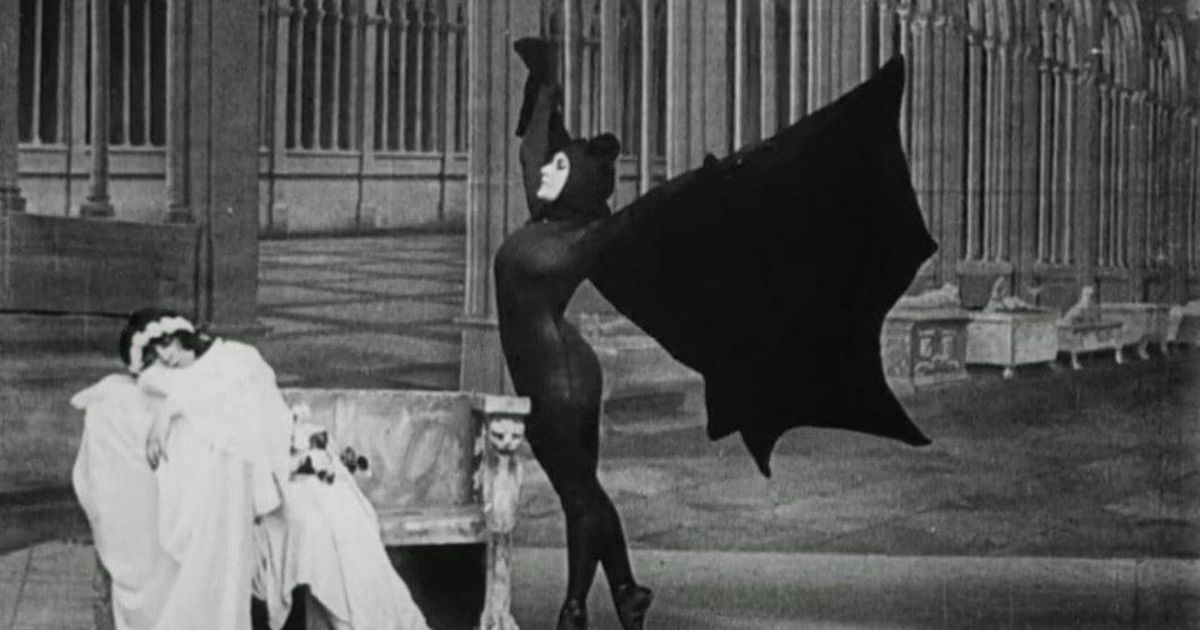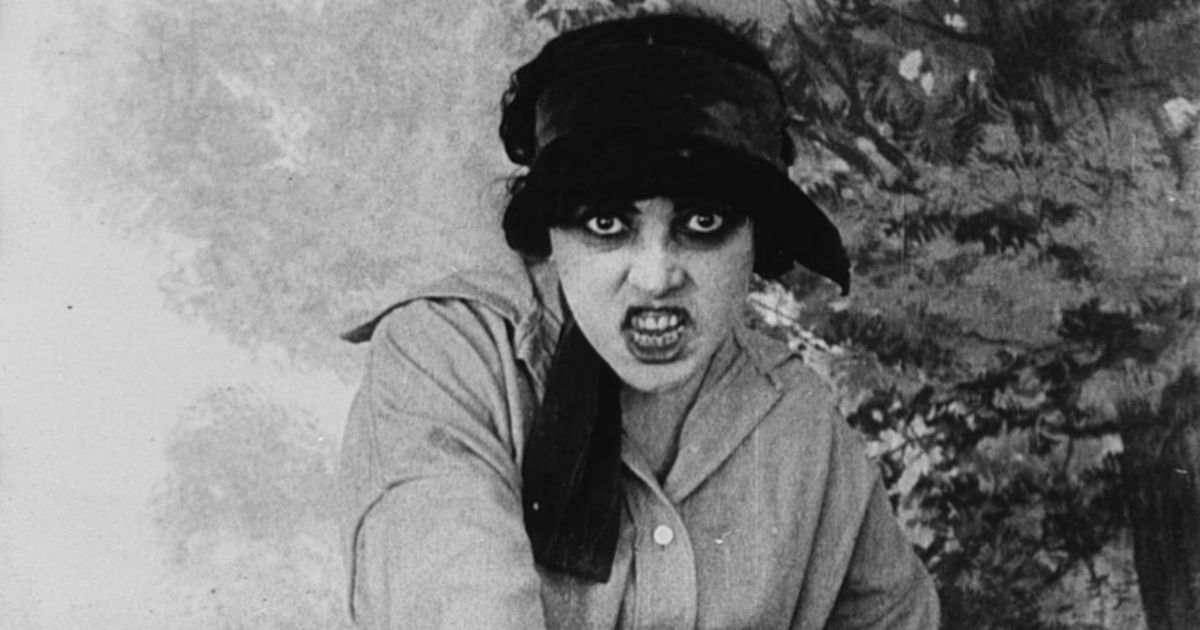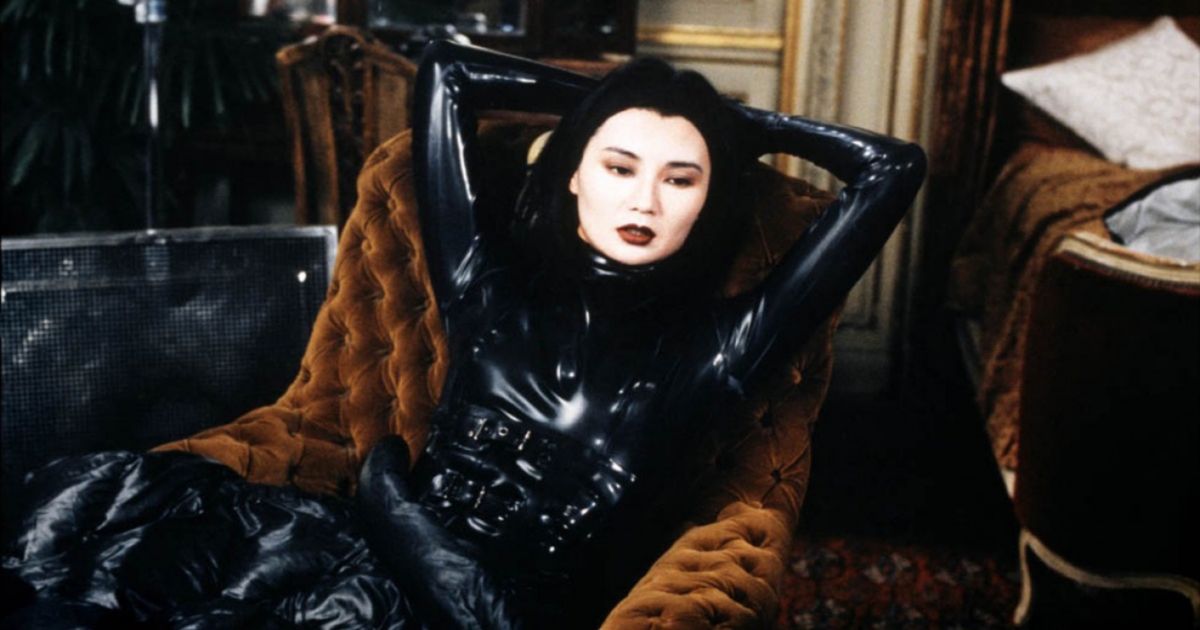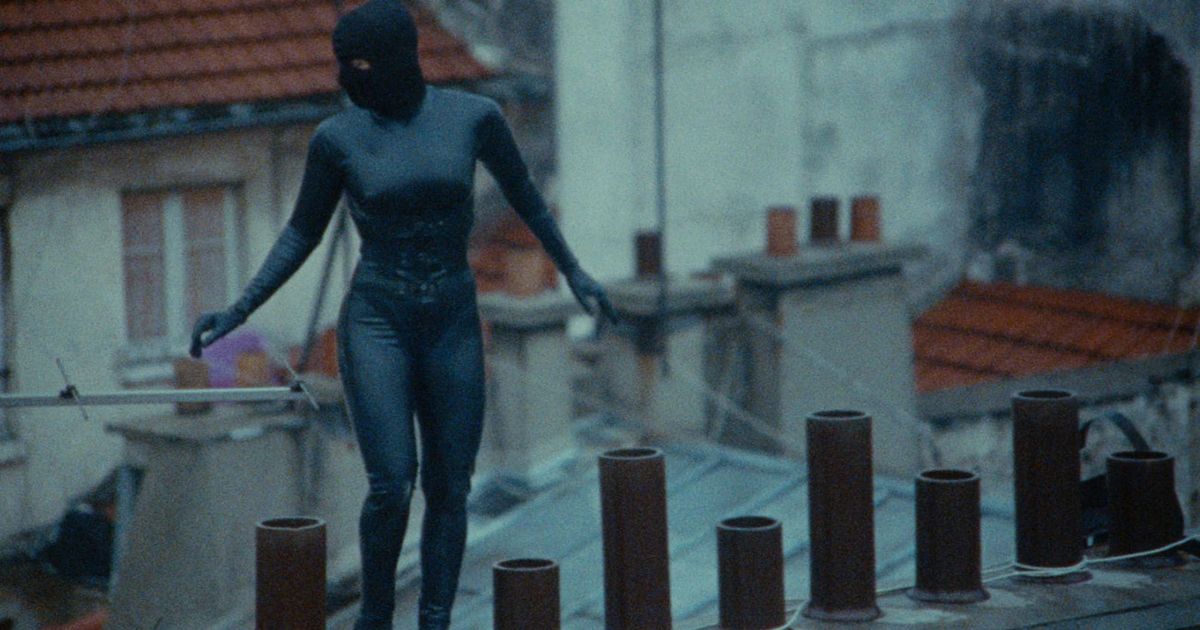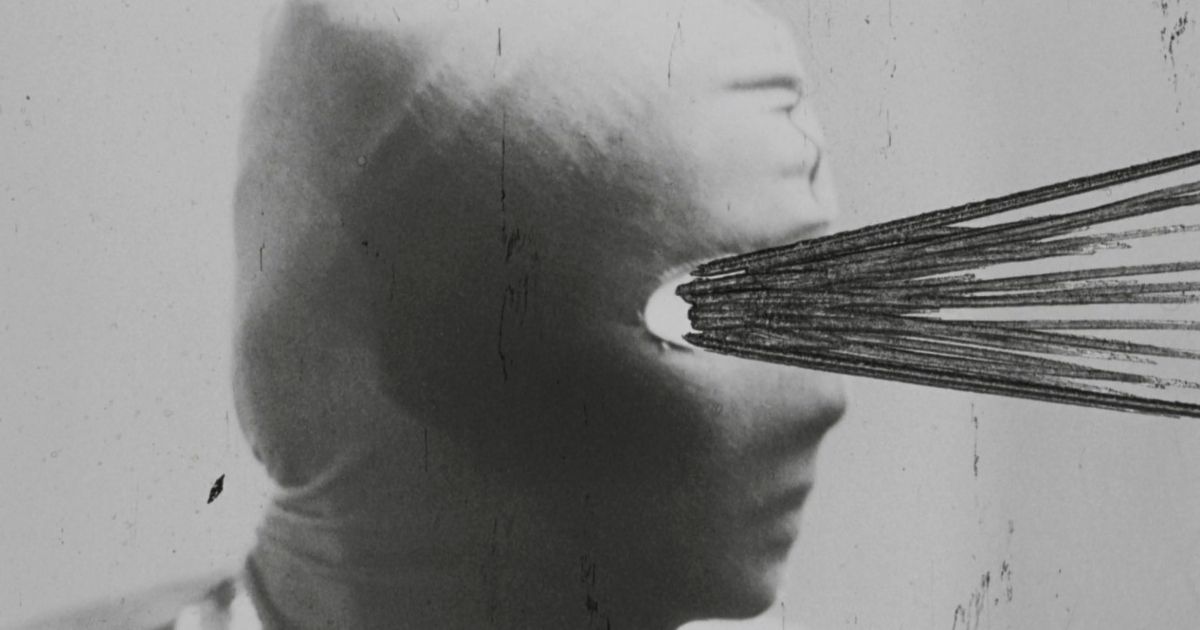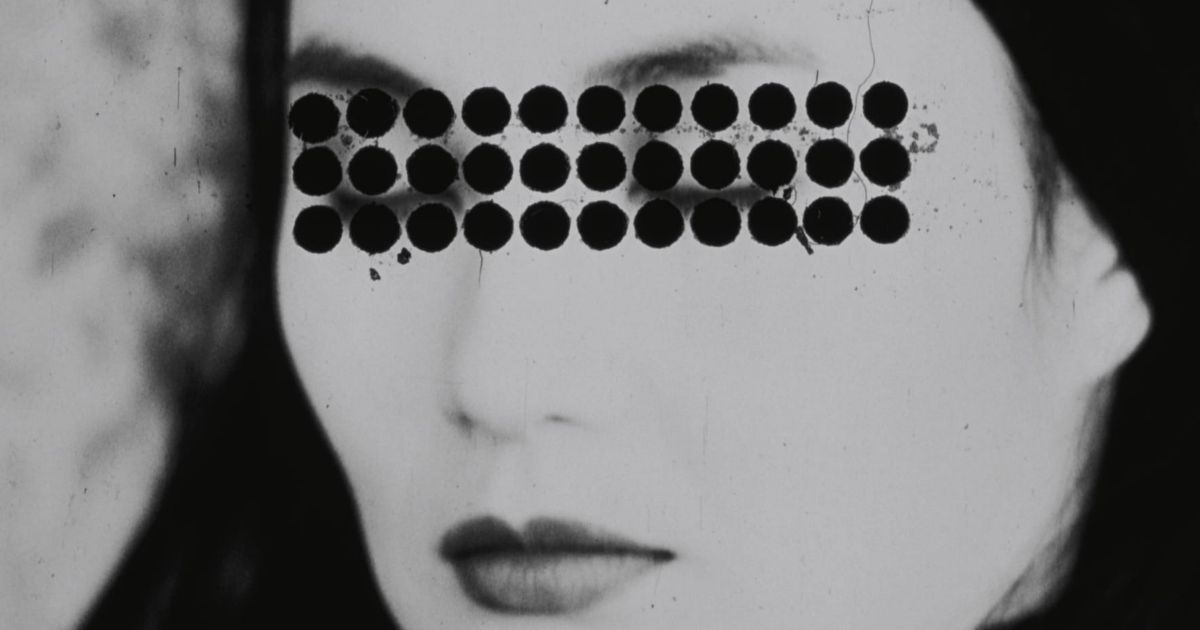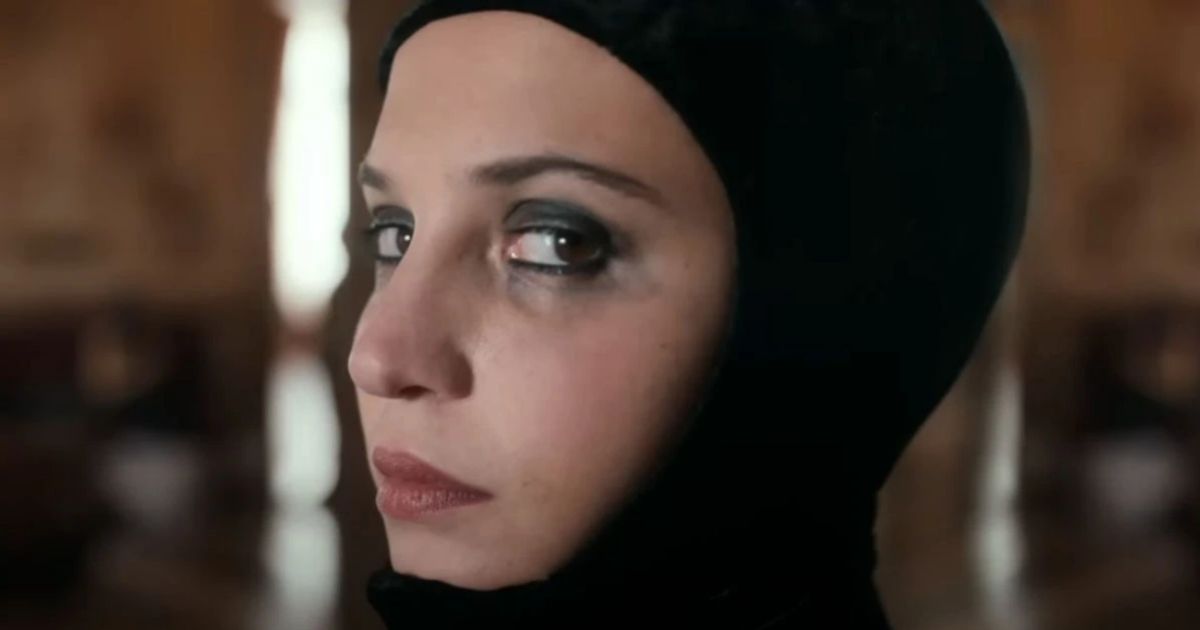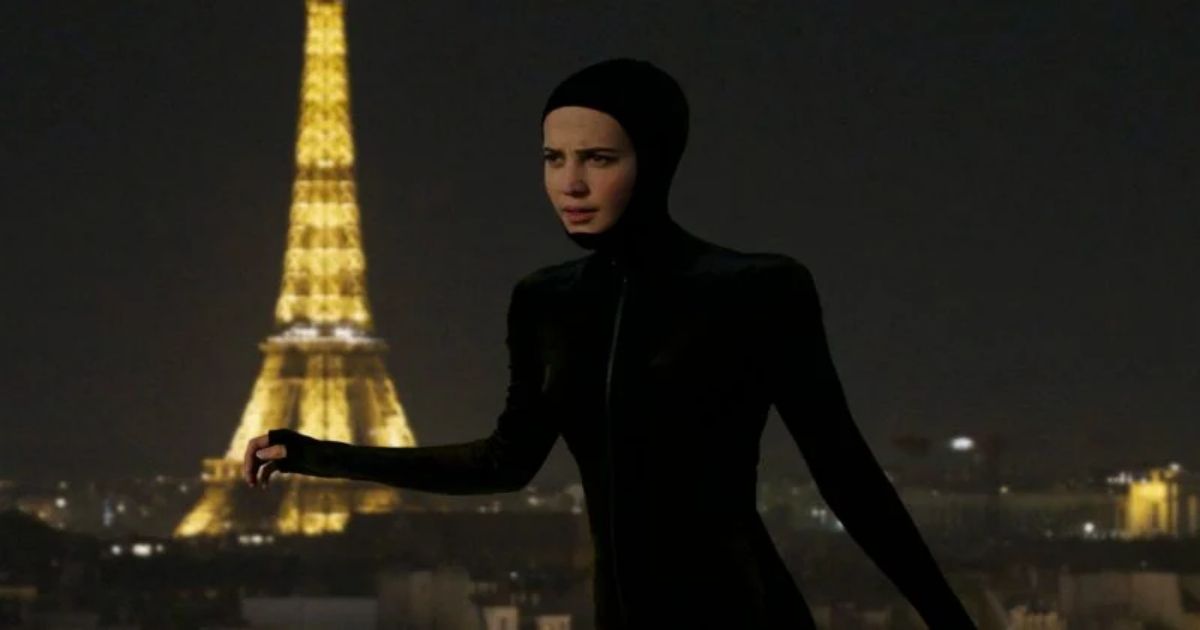Film is the most haunted of art forms; the ghosts of past movies and actors, like apparitions, inform each new movie, and sometimes a remake can be an exorcism, a way to deal with this haunting and start over. HBO recently began airing its new miniseries Irma Vep (which first premiered at the 2022 Cannes Film Festival) to unanimous critical praise, debuting with a perfect score on Rotten Tomatoes.
"It's a masterful handling of visual vocabularies," writes David Cote of The A.V. Club, "arguably the most sophisticated serial moviemaking HBO has ever produced.” That's certainly high praise, considering the vast pedigree of HBO's excellent different miniseries, but it's strangely deserved. It's doubly strange, because Irma Vep (an anagram for 'vampire') is a remake of its director's own film Irma Vep, which was a movie about remaking the 1915 silent movie serial Les Vampires.
The vampiric onion here contains multiple layers of meta movie magic, and the new Irma Vep is brilliantly in dialogue with more than a century of cinema. This is fitting, as writer/director Olivier Assayas was once a film critic for the lauded French magazine Cahiers du Cinema, so his filmography is frequently in conversation with film itself. Another former Cahiers critic-turned-director, the legendary Jean-Luc Godard, once said, "In order to criticize a movie, you have to make another movie," and that seems to be exactly what Assayas has been doing: turning his film criticism into actual film.
Irma Vep may be on television now, but it has a long history. The seed for it was planted with arguably the greatest movie serial ever made, Les Vampires, which helped the medium become such an influence that it would pave the way for television; the seed grew into a flower of a film in the '90s, a truly international masterpiece with Assayas' Irma Vep; the flower has now been plucked and placed in the vase of television itself, turning it back into a serial of sorts once again. Here is the strange history of the brilliant Irma Vep, which is a kind of ghostly cinematic history itself.
Les Vampires
French director Louis Feuillade, in a filmmaking career of less than 20 years, directed roughly 700 films (the majority of which were shorts) between 1907 and 1924. In this early cinematic era, essentially a wild west of artistry in which there were hardly any real rules, the silent movie serial became immensely popular. Film studios saw the lucrative possibilities of creating multiple installments of the same property after the success of a 1912 two-reeler titled What Happened to Mary? This was before the serialized fictional dramas of radio programs in the 1920s, and obviously long before television; in a sense, the movie serial created episodic TV as we know it.
There was a sudden explosion of movie serials, with some, such as the beloved Perils of Pauline, hitting theaters bi-weekly. Feuillade dove into the serial game with early work like Bout-De-Zan, which consisted of 60 short films about a mischievous little boy between 1912 and 1916. His first big masterpiece came with the 1912 serial Fantomas, which paved the way for mystery thrillers, the spy genre, and even superhero movies to some degree. In 1915, Feuillade's filmmaking career would be interrupted for service in The Great War, but the director suffered a heart attack. In his time of convalescence, he developed what would become his most well-known masterpiece, Les Vampires.
With World War I raging, infamous anarchist groups like the Bonnot Gang roaming the streets, and the kingdoms of Europe quickly changing, Les Vampires' depiction of a society out of control resonated with general audiences, who flocked to see the serials. They loved this weird, unpredictable series of films about a labyrinthine criminal underworld called the Vampires, and how they'd sunk their fangs into every facet of French existence; they loved watching the journalists and detectives attempt to track them down, and the delightful cat and mouse pursuits which would ensue; they loved the odd, sometimes dreamlike or hallucinatory nature of certain sequences, something several famous Surrealist artists picked up on at the time. Perhaps above all, most of them loved Musidora.
Musidora is Irma Vep
Jeanne Roques renamed herself Musidora in her childhood, preferring the word which meant 'gift of the Muses' — that's what kind of person she was. Musidora was a pioneering 'vamp,' a term for a kind of early femme fatale who chews up men and spits them out, derived from Rudyard Kipling's poem The Vampire. Alongside Theda Bara, another pioneering 1910s actress, Musidora was a truly magnetic vamp, and Feuillade would work with her numerous times after Les Vampires (she would go on to write and direct her own films as well). She was so charming, with eyes so fascinating, that when the police actually banned Les Vampires due to its depiction of criminality, she single-handedly convinced the police chief to overturn the decision, after Feuillade and the production studio Gaumont had already attempted and failed.
Musidora is a large part of why Les Vampires succeeds, and it's her character, Irma Vep, who becomes the namesake of the subsequent films here. Her unapologetic, queer, angry, weird, and sensual performance is a cinematic landmark. Feuillade, however, deserves the majority of the credit; he created a ten-part, eight-hour masterpiece which the great Jonathan Rosenbaum has called "one of the supreme delights of film." Feuillade's techniques, filming long takes indoors in a very stationary way, contrasted with the accelerated motion of his outdoor scenes, the minimal use of titles (or 'dialogue'), the oneiric editing and lack of montage, and what the French could only call a certain je ne sais quoi, all combine to create a perfect spectacle.
While it has undoubtedly influenced French cinema for a century, it's often been unseen and very difficult to find in America (at least until the always incredible and important Criterion Collection stepped in); one wonders what the history of American cinema would be if we had Feuillade instead of Griffiths.
Irma Vep is Maggie Cheung
In 1996, director Olivier Assayas released Irma Vep, with Maggie Cheung starring as herself, an actor hired for the titular role in a remake of Les Vampires. The film finds her caught up in a cinematic circus: actors are having personal crises, the crew wants to sleep with her, money is running out, and the director (played by legendary French actor Jean-Pierre Léaud) is having a mental breakdown. The film, like many of Assayas', is obsessed with motion; the term 'movies' does come from the term movement after all, and what is a motion picture without it? Still photography took the leap into greater possibility with the motion picture, and Assayas embraces it.
Long takes are filled with swarming bodies as the hectic film shoot, dinner scenes, and hotel sequences play themselves out, Cheung often serving as a bemused bystander. The film is a perfect opportunity for Assayas to comment about the film industry, utilizing one of the most famous French movies of all time to tell a story of globalization, art, and the power of acting.
The international element, always an extremely strong hallmark of an Assayas film, is very present in Irma Vep — the Hong Kong actor in the French film, with English spoken between them, and a range of European nationalities swirling around the screen. Sonic Youth shreds on the soundtrack in one scene, French crooner Serge Gainsbourg in another, Malian guitarist Ali Farka Touré in another. Assayas is keenly interested in the 'state' of French cinema (something seemingly represented by Les Vampires itself) and the influence of globalization on it; journalists have conversations about John Woo movies and Hollywood blockbusters, while members of the film crew bemoan the state of the industry.
Olivier Assayas and Maggie Cheung
Cheung is incredible as always, and Léaud is a real hoot. Their on-set interactions are delightful, and the recreations of several Les Vampires scenes offers Assayas that aforementioned chance at film criticism. By directing his own version of Les Vampires (or having his actors do so in his film), he's able to comment on the decision-making, analyze each gesture, and dissect the feelings and meanings behind the film. By picking the iconic Les Vampires, it's almost as if he's able to address French cinema itself. Its meta-textual deconstruction leads to one of the most fascinating endings in all film history.
Irma Vep was a turning point in their careers; it was Assayas' breakthrough film and paved the way for his future, it took Cheung out of Hong Kong for the first time and made her an international star, and it led to their marriage. They divorced in 2001, but made another film together, the international masterpiece Clean in 2004, for which Cheung won the Best Actress award at the Cannes Film Festival; it would be her last major role before her mysterious retirement. Assayas tells Indie Wire:
Maggie has disappeared from my life, and she’s vanished from cinema… [And] inside the very idea of returning to Irma Vep is to revive those memories. Instead of doing a remake or reboot or whatever, I’m trying to deal with memory, because the original film deeply changed my life, and it would feel like cheating if I did not also mention the personal and even intimate part of it.
Olivier Assayas on Irma Vep
Revive Irma Vep he did. With his new series from A24 and HBO, Assayas is revisiting the ghosts of the past 26 years later, be it 1915 or 1996, the ghosts of France, the ghost of Maggie, the ghost of cinema. As he tells Indie Wire:
It’s a comedy that’s also a ghost story. It’s about memory and time, about modern society and modern filmmaking. There are several serious, reflective elements in the story, and you need to strike a lighter tone to incorporate them. It’s simpler that way, and it helps you get your ideas across.
Assayas told Some Came Running that the original Irma Vep was like "a Polaroid of the contradictions of French film making at that time," and in this way the new Irma Vep is more an iPhone selfie of the current state of cinema. In a rather brilliant way, it's not a remake which looks to the past but one which uses the past as a springboard to document the present and postulate some future for film, with each iteration (Les Vampires in 1915, Irma Vep in 1996 and 2022) chronicling what's changed.
"I think everything is different!" Assayas tells Decider. "The digital migration of cinema, TV has been totally revolutionized, we’re all on the internet now, using social media. The thing is that cinema changes along with the world." He continues:
It’s not so much how everything has changed since I was making the other Irma Vep, it’s more that the process of transformation for the cinema is never finished. What we are trying to capture with this, the full version, is the nature of that change happening now. It’s always present tense, down to the moment.
As such, the new Irma Vep is brimming with not just postmodern self-referentiality but a firm awareness of contemporary reality. At a press conference near the opening of the show, the actor now cast as Irma Vep fields questions about her big superhero movie and her future in some Cinematic Universe-type stuff she is resolutely not excited about; "this is what people want right now," her agent tells her, "high-concept, feminist, lady-led superhero movie!" Meanwhile, reporters ask her about "the rise of populism, gender equality," and "the future of Europe," all of which the new Irma Vep takes into account in its own 'State of the Union (of cinema)' way.
Irma Vep is Alicia Vikander
Alicia Vikander, though she is also international, plays this new Irma as a very different character than Cheung's (who will be mentioned within the series in a meta way). Playing Mira Harberg, an American actor in the midst of tabloid gossip and the massive success of her recent sci-fi action blockbuster, Vikander's role is a much more vocal, confident, and sometimes bratty one.
Her too-cool-for-school personal assistant, flipping through a Deleuze text flippantly, is the seductive and funny Regina (played with surprising excellence by model Devon Ross), and between the two of them, these young women have enough vocal fry to plate with a cheeseburger. It's a portrait of the generation, just as the '96 Irma Vep took a snapshot of what it meant to be young, cool, French, or in the film industry at the time.
Vincent Macaigne (a director himself) is absolutely wonderful as the film's director this time around, simultaneously slumped and manic with a panic that's somehow silly and intimidating all at once. Vikander is great as well and, like Cheung, attains a mysterious power when she tries on the 'catsuit' of Irma Vep, the slinky, black, skin-clinging fabric that the queen of criminals sometimes wears when she isn't in disguise.
Irma Vep is Cinema
There's a luster to the suit, something more than commodity fetishism and something almost magical, which leads the actor playing Irma Vep in both the movie and the series to attempt some dangerous and risky things they otherwise wouldn't. It's as if the costume, a mask for the body, liberates the individual, just as wearing a different personality or taking on a different role or project can. Putting on the suit, a metaphor for playing a role and acting itself (and creating a remake), requires entering into history and conversing with its inhabitants.
Maybe the Irma Vep remake isn't an exorcism, then. Maybe's it's a séance, summoning up the dead, knowing they can never really be removed or cleansed, but can at least be spoken with, learned from, possessed. Either by watching past events or by creating something which will be watched in the future, every movie is in dialogue with cinema itself, talking with ghosts. Les Vampires came out more than a century ago, and everyone who's worked on it is dead, but, as the director within this new HBO series opines, "The ghost of Irma Vep has been haunting cinema ever since." Like an actual vampire, this beautiful dead thing can never die.
Irma Vep is available to watch on HBO Max, with new episodes on Monday nights.


